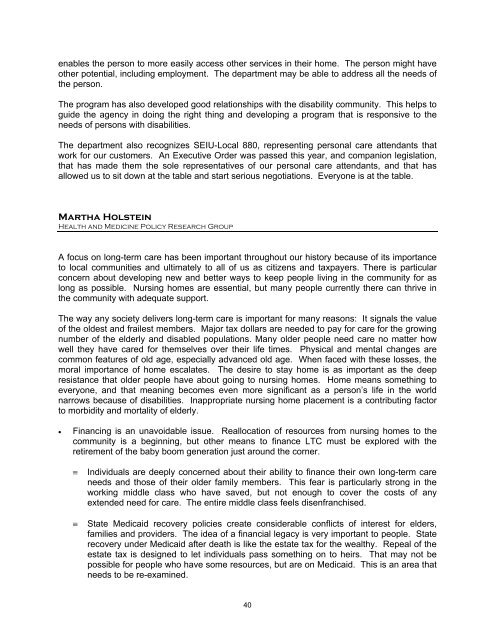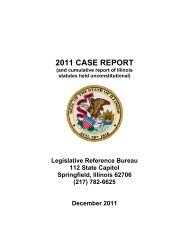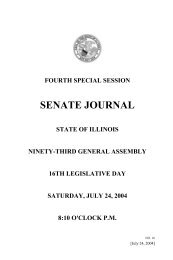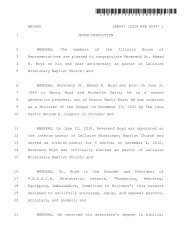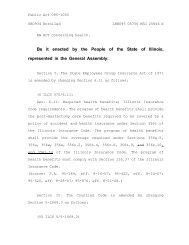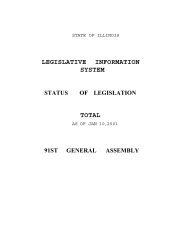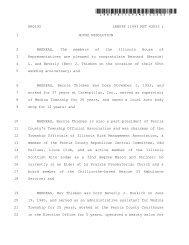Long-Term Care - Illinois General Assembly
Long-Term Care - Illinois General Assembly
Long-Term Care - Illinois General Assembly
Create successful ePaper yourself
Turn your PDF publications into a flip-book with our unique Google optimized e-Paper software.
enables the person to more easily access other services in their home. The person might have<br />
other potential, including employment. The department may be able to address all the needs of<br />
the person.<br />
The program has also developed good relationships with the disability community. This helps to<br />
guide the agency in doing the right thing and developing a program that is responsive to the<br />
needs of persons with disabilities.<br />
The department also recognizes SEIU-Local 880, representing personal care attendants that<br />
work for our customers. An Executive Order was passed this year, and companion legislation,<br />
that has made them the sole representatives of our personal care attendants, and that has<br />
allowed us to sit down at the table and start serious negotiations. Everyone is at the table.<br />
Martha Holstein<br />
Health and Medicine Policy Research Group<br />
A focus on long-term care has been important throughout our history because of its importance<br />
to local communities and ultimately to all of us as citizens and taxpayers. There is particular<br />
concern about developing new and better ways to keep people living in the community for as<br />
long as possible. Nursing homes are essential, but many people currently there can thrive in<br />
the community with adequate support.<br />
The way any society delivers long-term care is important for many reasons: It signals the value<br />
of the oldest and frailest members. Major tax dollars are needed to pay for care for the growing<br />
number of the elderly and disabled populations. Many older people need care no matter how<br />
well they have cared for themselves over their life times. Physical and mental changes are<br />
common features of old age, especially advanced old age. When faced with these losses, the<br />
moral importance of home escalates. The desire to stay home is as important as the deep<br />
resistance that older people have about going to nursing homes. Home means something to<br />
everyone, and that meaning becomes even more significant as a person’s life in the world<br />
narrows because of disabilities. Inappropriate nursing home placement is a contributing factor<br />
to morbidity and mortality of elderly.<br />
• Financing is an unavoidable issue. Reallocation of resources from nursing homes to the<br />
community is a beginning, but other means to finance LTC must be explored with the<br />
retirement of the baby boom generation just around the corner.<br />
≡ Individuals are deeply concerned about their ability to finance their own long-term care<br />
needs and those of their older family members. This fear is particularly strong in the<br />
working middle class who have saved, but not enough to cover the costs of any<br />
extended need for care. The entire middle class feels disenfranchised.<br />
≡ State Medicaid recovery policies create considerable conflicts of interest for elders,<br />
families and providers. The idea of a financial legacy is very important to people. State<br />
recovery under Medicaid after death is like the estate tax for the wealthy. Repeal of the<br />
estate tax is designed to let individuals pass something on to heirs. That may not be<br />
possible for people who have some resources, but are on Medicaid. This is an area that<br />
needs to be re-examined.<br />
40


